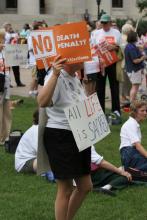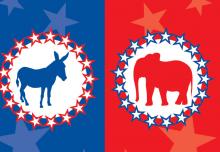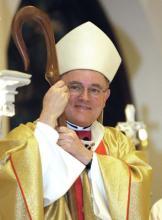right
RICHARD VIGUERIE is as responsible as anyone for the success of the conservative movement in this country. A pioneer in political direct mail, Viguerie has been involved from the radical edges of the Right in every Republican campaign from Goldwater to Romney; he's been called the "funding father of the conservative movement." He helped start hundreds of entities from Conservative Digest to Gun Owners of America, from the National Conservative Political Action Committee to the Moral Majority—spanning the political spectrum from Right to Far Right. Just before the 2012 election, he launched MyOwnSuperPAC because of "frustration at how weak and ineffective the Romney campaign's ads have been with its soft approach to Barack Obama—hardly ever mentioning Obama's radical, neo-Marxist vision for America's future," and insisting that "Obama is NOT failing. He's succeeding at doing exactly what he set out to do—and that's destroy capitalism and destroy the America you and I grew up in." So no one is going to mistake Viguerie for a squishy liberal.
And yet Viguerie's Catholic faith has led him to a surprising position on the issues of capital punishment and prison reform. The conservative icon talked with Sojourners editor-in-chief Jim Wallis in September about why he thinks an unexpected Left-Right alliance might turn the tide against the death penalty.
Jim Wallis: As you and I both know, we're often stuck in political straitjackets. There are issues that we could work together on, particularly as people of faith, that would help politicians do better than they sometimes do. I'd like to start with this: You've said that, as a Catholic, you're against the death penalty. Why is your faith as a Catholic central to this, and how has that turned you against the death penalty?
Richard Viguerie: My own road to Damascus on this issue came many years ago. When I was a young Republican in Houston in the late '50s and early '60s, I was a very hard-core, law-and-order type: "lock 'em up, throw the key under the jail so they never get out." In those days, law enforcement agencies were kind of immune from criticism. Over a period of time, I and many other conservatives have been disabused of the fact that people in law enforcement are above any mistakes or abuse of power.

I AM AGAINST the death penalty in principle. The deliberate killing of prisoners does not demonstrate our society's respect for life, which we are trying to teach—especially to those who violate it. We simply should not kill to show we are against killing. It's also easy to make a, yes, fatal mistake, as alarming DNA testing has demonstrated, revealing some death row inmates to be innocent. In addition, the death penalty is clearly biased against poorer people, who cannot afford adequate legal representation, and is outrageously disproportionate along racial lines. The facts are that few white-collar killers sit on death row, and fewer are ever executed. And there is no evidence that capital punishment deters murder; the data just doesn't show that.
At a retreat I attended a couple of years ago, conservative activist Richard Viguerie approached me and said, "Jim, let's do something together to really shake up politics." Viguerie had become a friend, so I asked him what that might be. "I am a Catholic," Viguerie said. "I am against the death penalty, and I think it's time for conservatives and liberals who agree on that to begin to work together." I was fascinated at the thought of unlikely partners helping to accomplish that together. So we have had several dinner meetings over the last two years with both conservative and liberal leaders—mostly people of faith—to discuss the issue.
Here are some basic facts. There have been 1,312 executions since 1976, when the death penalty was reinstated following a 10-year moratorium. There were 43 prisoners killed in 2011, and 35 so far in 2012. As of April 2012, there were 3,170 people on death row. Forty-two percent are black, 43 percent are white, and 12 percent are Latino. Thirty-three states have the death penalty; 17 have abolished it and several have abolition legislation pending. Since 1973, 141 people have been exonerated and set free from death sentences because of new evidence—people who shouldn't have even been prisoners and were almost killed by the state due to false or faulty evidence. Eighteen of them were released because of DNA evidence. Who knows how many people have been executed unjustly?

What if I told you that the political discourse in America has proven for decades what PSY’s ‘Gangnam Style’ phenomenon has proven recently? What do I mean? It is simply this: people can indeed get tirelessly excited about something that sounds good without understanding its contents.
Like every election year, 2012 seems to have its own particular set of buzzwords and slogans. From “the forgotten 47 percent” to “you did build that,” those on the left and the right are each trying to infuse the political discourse with their own partisan lingo. But it’s time somebody put a stop to the hype and asks the sensible question: “What is the real meaning behind all of this?”
Truth is, both political parties have been directing their resources to highlight their differences more than anything else. They are platforms defined by contrast, not by real facts. This should lead us to raise the question that is usually unasked (and therefore unanswered) amid the consistent heat of the American political climate: “If the government is designed ultimately for the good of the people, is the political discourse today reflective of that goal?”
To this question, the German philosopher Friedrich Nietzsche answers, “No.”

A series of recent developments are renewing questions about the Catholic bishops' alignment with the Republican Party, with much of the attention focusing on comments by Philadelphia Archbishop Charles Chaput, who said he “certainly can’t vote for somebody who’s either pro-choice or pro-abortion.”
In a wide-ranging interview published Sept. 14, Chaput also echoed the views of a number of prominent bishops when he praised Republican vice presidential nominee Paul Ryan for trying to address the “immoral” practice of deficit spending through his libertarian-inflected budget proposals.
"Jesus tells us very clearly that if we don’t help the poor, we’re going to go to hell. Period. There’s just no doubt about it,” Chaput told National Catholic Reporter.
“But Jesus didn’t say the government has to take care of them, or that we have to pay taxes to take care of them. Those are prudential judgments. Anybody who would condemn someone because of their position on taxes is making a leap that I can’t make as a Catholic.”
Chaput stressed that he is a registered independent “because I don’t think the church should be identified with one party or another.” But he said that the Democratic Party’s positions on abortion rights, gay rights, and religious freedom “cause me a great deal of uneasiness.”
He added that economic issues are “prudential judgments” open to a variety of legitimate approaches. Abortion, on the other hand, is “intrinsically evil” and must always be opposed.
That is a talking point voiced by many Catholic conservatives, including Ryan himself. Last Friday, Ryan told the Christian Broadcasting Network that opposition to abortion and same-sex marriage, and support for religious freedom, are all “non-negotiables” for a Catholic politician while “on other issues, of economics and such like that, that’s a matter of prudential judgment.”